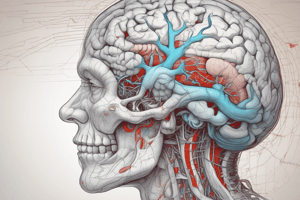Podcast
Questions and Answers
A positive Romberg test result indicates which of the following?
A positive Romberg test result indicates which of the following?
- Vestibular dysfunction
- Intact cerebellar function
- Sensory ataxia (correct)
- Normal proprioception
When assessing light touch sensation with a cotton swab, what is the best approach?
When assessing light touch sensation with a cotton swab, what is the best approach?
- Begin testing proximally and move distally (correct)
- Use sharp and dull objects simultaneously
- Focus on testing only one foot for consistency
- Compare sensations bilaterally in random areas
If a patient cannot detect vibration in their toes but can feel it on their shins, this likely indicates what condition?
If a patient cannot detect vibration in their toes but can feel it on their shins, this likely indicates what condition?
- Spinal cord injury
- Normal sensation
- Central nervous system damage
- Peripheral neuropathy (correct)
Which reflex should be evaluated to assess the function of the L2-L4 spinal segments?
Which reflex should be evaluated to assess the function of the L2-L4 spinal segments?
What does a reflex response graded as '0' signify?
What does a reflex response graded as '0' signify?
The presence of exaggerated thoracic curvature in a patient likely indicates which condition?
The presence of exaggerated thoracic curvature in a patient likely indicates which condition?
To confirm the suspicion of kyphosis, which additional assessment would be most helpful?
To confirm the suspicion of kyphosis, which additional assessment would be most helpful?
Tremors and poor coordination in an older patient most suggest which of the following conditions?
Tremors and poor coordination in an older patient most suggest which of the following conditions?
What level of consciousness is the patient most likely demonstrating with drowsiness and a response only to verbal commands?
What level of consciousness is the patient most likely demonstrating with drowsiness and a response only to verbal commands?
What would be the Glasgow Coma Scale (GCS) score if the patient opens eyes to voice, localizes pain, and uses inappropriate words?
What would be the Glasgow Coma Scale (GCS) score if the patient opens eyes to voice, localizes pain, and uses inappropriate words?
Which special test would confirm meningeal irritation in a suspected case of meningitis?
Which special test would confirm meningeal irritation in a suspected case of meningitis?
What does a positive Brudzinski’s sign indicate when the patient flexes their knees and hips during neck flexion?
What does a positive Brudzinski’s sign indicate when the patient flexes their knees and hips during neck flexion?
What term describes the nurse assisting the patient in moving the shoulder joint?
What term describes the nurse assisting the patient in moving the shoulder joint?
If the patient can perform flexion and extension but is unable to fully abduct their arm, which condition might the nurse suspect?
If the patient can perform flexion and extension but is unable to fully abduct their arm, which condition might the nurse suspect?
What speech-related condition might the nurse suspect in a patient struggling to form coherent sentences and understand verbal instructions?
What speech-related condition might the nurse suspect in a patient struggling to form coherent sentences and understand verbal instructions?
Which cranial nerve is most relevant for speech and language assessment in a patient with communication difficulties?
Which cranial nerve is most relevant for speech and language assessment in a patient with communication difficulties?
Flashcards
Level of Consciousness (LOC) Obtunded
Level of Consciousness (LOC) Obtunded
A state of decreased alertness where the patient is difficult to arouse and only responds to loud/painful stimuli.
GCS Score 7
GCS Score 7
A score on the Glasgow Coma Scale indicating a moderate level of neurological impairment.
Meningitis
Meningitis
Inflammation of the meninges (membranes surrounding the brain and spinal cord).
Brudzinski's Sign
Brudzinski's Sign
Signup and view all the flashcards
Passive ROM
Passive ROM
Signup and view all the flashcards
Receptive Aphasia
Receptive Aphasia
Signup and view all the flashcards
Cranial Nerve XII (Hypoglossal)
Cranial Nerve XII (Hypoglossal)
Signup and view all the flashcards
Balance/Coordination Issues
Balance/Coordination Issues
Signup and view all the flashcards
Romberg test positive result
Romberg test positive result
Signup and view all the flashcards
Light touch sensation assessment
Light touch sensation assessment
Signup and view all the flashcards
Vibration sense absent in toes, present in shins
Vibration sense absent in toes, present in shins
Signup and view all the flashcards
L2-L4 spinal segments function
L2-L4 spinal segments function
Signup and view all the flashcards
Reflex response grade 0
Reflex response grade 0
Signup and view all the flashcards
Exaggerated thoracic curvature
Exaggerated thoracic curvature
Signup and view all the flashcards
Confirming kyphosis diagnosis
Confirming kyphosis diagnosis
Signup and view all the flashcards
Tremors and poor coordination in hands
Tremors and poor coordination in hands
Signup and view all the flashcards
Study Notes
Neurological Emergency Case Study
- Patient Presentation: 52-year-old male, head trauma, drowsy, verbal response only, slurred speech, pupils equal and reactive to light.
- Level of Consciousness: Obtunded (likely).
- Glasgow Coma Scale (GCS): Score is 7 (eyes open to voice, localized response to pain, inappropriate words).
Suspected Meningitis Case Study
- Patient Presentation: 24-year-old student, severe headache, stiff neck, fever, suspected meningitis.
- Meningeal Irritation Test: Brudzinski's sign.
- Positive Brudzinski's Sign: Flexion of knees and hips when neck is flexed.
Musculoskeletal Injury Case Study
- Patient Presentation: Difficulty with shoulder movement following a fall, limited abduction, pain with active range of motion.
- Passive ROM: Nurse assists patient in moving the joint.
- Possible Condition: Rotator cuff injury (limited abduction but flexion and extension possible).
Stroke Symptoms Case Study
- Patient Presentation: Elderly woman, struggles to form coherent sentences, difficulty understanding verbal instructions.
- Suspected Conditions: Receptive or expressive aphasia (or global aphasia).
- Cranial Nerve for Speech Assessment: Cranial nerve XII (Hypoglossal), also important for speech.
Balance and Coordination Case Study
- Patient Presentation: Frequent falls, difficulty maintaining balance, unsteady gait during tandem walk.
- Brain Region Impaired: Cerebellum.
- Romberg Test: Positive result indicates sensory ataxia.
Pain and Sensory Response Case Study
- Patient Presentation: 35-year-old male with diabetes, numbness and tingling in both feet.
- Sensory Examination Techniques for Light Touch: Compare sensations bilaterally, start proximally and move distally.
- Vibration Sense Test (Tuning Fork): Inability to detect vibration in toes, but detection on shins, suggests peripheral neuropathy.
Motor Function and Reflexes Case Study
- Patient Presentation: 28-year-old athlete, weakness in right leg, knee injury.
- Reflex for L2-L4 Spinal Segments Assessment: Patellar reflex.
- Reflex Grade 0: No reflex response (indicates nerve damage).
Musculoskeletal Posture Case Study
- Patient Presentation: Middle-aged teacher, back pain, hunched posture, exaggerated thoracic curvature (kyphosis).
- Condition: Kyphosis.
- Further Assessment: Measuring spinal flexibility during forward bending.
Neurological Coordination Case Study
- Patient Presentation: 62-year-old man, tremors, poor coordination, hand tremors when reaching for objects.
- Possible Condition: Intention tremor or Parkinsonian tremor.
Studying That Suits You
Use AI to generate personalized quizzes and flashcards to suit your learning preferences.




